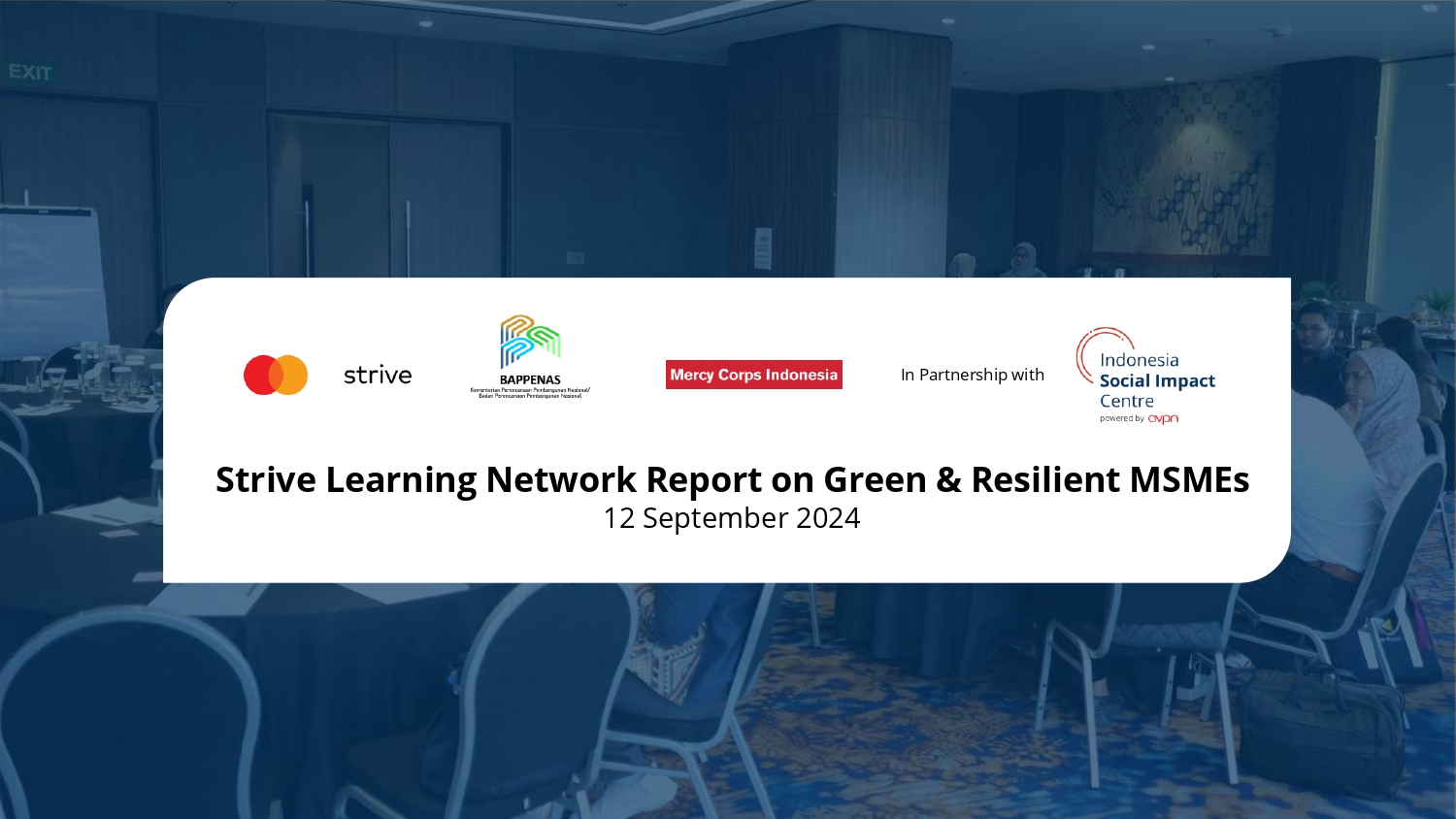
Striving to Thrive (2024)
Report on Green & Resilient MSMEs
Government/Regulator ● Develop Clear Green MSME Standards and Regulations: Establish uniform, sector-specific criteria for green MSMEs, leveraging existing frameworks such as RPJPN, OJK’s green taxonomy, and ASEAN guidelines. These standards should guide MSMEs in transitioning to green practices and encourage sustainability throughout their value chains. ● Provide Financial Incentives and Support: Create pathways for affordable financing through sustainable finance taxonomies, low-interest loans, and market-based instruments like sustainability-linked bonds. Government-backed programs should also include disaster and climate change resilience as safety nets for MSMEs. ● Facilitate Integration into Global Value Chains (GVCs): Promote MSME participation in GVCs by supporting digital literacy, eco-labelling, and eco-design certifications. Encourage the use of green technologies developed in collaboration with universities and ensure MSMEs can access these technologies affordably. Private Sector ● Collaborate with MSMEs for Green Practices: Large companies should engage MSMEs in green initiatives through capacity building, supply chain support, and co-branded sustainability efforts. Case studies like GRAB demonstrate the benefits of collaboration on eco-friendly logistics and product offerings. ● Invest in Sustainable MSME Development: Private companies should offer tailored financial services for MSMEs, such as partnerships with fintech firms to create scalable and user-friendly products. Encourage innovation in green technologies and processes, and work to provide access to these for MSMEs. ● Promote Green Consumerism: Lead initiatives to increase demand for green products by offering incentives (e.g., cashback or loyalty programs) to customers who choose sustainable options. Raising awareness of green products will help MSMEs remain profitable and attract investors. MSME Enablers (Nonprofits/Research/Community Organizations) ● Provide Capacity Building and Peer Learning Platforms: Establish both online and offline platforms for MSMEs to learn about incorporating green practices into their operations, as well as climate change resilience. Create spaces for peer-to-peer learning and showcase success stories like Du Anyam’s eco-tourism and GRAB’s green fleet initiative. ● Facilitate Local Value Loop Development: Support the development of circular economies within local communities by promoting the production, reuse, and recycling of materials. Help MSMEs build self-sufficient supply chains and create sustainable, community-driven business models. ● Support Green Technology Access: Partner with universities and tech developers to provide affordable green technology solutions to MSMEs. Assist MSMEs with implementing and maintaining these technologies, ensuring they can integrate them effectively into their business operations.
Metadata Dokumen
| Bidang Kategori | Kedeputian Bidang Kependudukan dan Ketenagakerjaan |
| Unit Kerja | Direktorat Pengembangan Usaha Mikro, Kecil, Menengah, dan Koperasi |
| Jenis Pengetahuan | Pengetahuan Explicit |
| Jenis Output | event |
| Referensi yang Digunakan | Pendekatan Kualitatif melalui Diskusi Kelompok dan Wawancara |
| Mitra (Unit Kerja/Instansi Lain) | Internal UKE (Direktorat Pengembangan Usaha Mikro, Kecil, Menengah, dan Koperasi) Instansi lain (Mastercard, Mercy Corps Indonesia) |
| Bisnis Proses |
In conclusion, the discussion group highlights the critical need for a well-defined and practical framework to support the transition of MSMEs to green practices. A clear and all-encompassing definition of green MSMEs is essential, using reliable sources like Bank Indonesia and OECD-ERIA. This definition should include simple criteria for evaluating sustainability in various sectors, such as energy conservation or waste management. Transitioning to green practices may be costly for MSMEs, so empowering local communities through circular economies and eco-tourism initiatives is crucial. Collaboration across the value chain, including peer-to-peer learning, capacity building, and government support, can facilitate MSMEs’ integration into domestic and global value chains. Case studies like Du Anyam and GRAB illustrate the benefits of involving local communities and leveraging big companies' support. Moreover, access to green technology, digital tools, and platforms is vital for MSMEs to participate in smart specialization value chains. Financial support mechanisms, including fintech partnerships, sustainable finance taxonomies, and market-based instruments, can provide the necessary resources for MSMEs to adopt green technologies and practices. These combined efforts will drive sustainability and competitiveness for MSMEs in both local and global markets. |
| Manfaat | In conclusion, integrating green practices into MSME operations requires a multi-faceted and strategic approach. First, establishing clear definitions and uniform standards through certification and guidelines is crucial to ensuring consistency across industries. This helps MSMEs navigate the complexities of adopting green practices. The role of the government is equally important, as proactive regulations and policy frameworks, such as those outlined in the RPJPN and OJK’s green taxonomy, can incentivize MSMEs to adopt environmentally sustainable practices. Additionally, providing accessible information and enhancing human resource skills through training and community networks will empower MSMEs to implement green practices. Financial support, including funding and incentives, is essential to overcome the higher upfront costs associated with transitioning to sustainable operations. Market demand for green products must also be stimulated through public awareness campaigns and the development of green product hubs, ensuring MSMEs remain competitive and attractive to investors. Finally, fostering a mindset shift within MSMEs—viewing green practices as opportunities for innovation rather than costs—will drive long-term resilience and productivity. Each sector, including government, businesses, and enablers, must collaborate, recognizing that even small steps can lead to collective progress toward a sustainable future for MSMEs |
| Hak Akses Dokumen | Terbuka |
| Dokumen Pengetahuan | |
| Tanggal Publikasi | 15 Oktober 2024 11:02:26 |
| Video | - |
